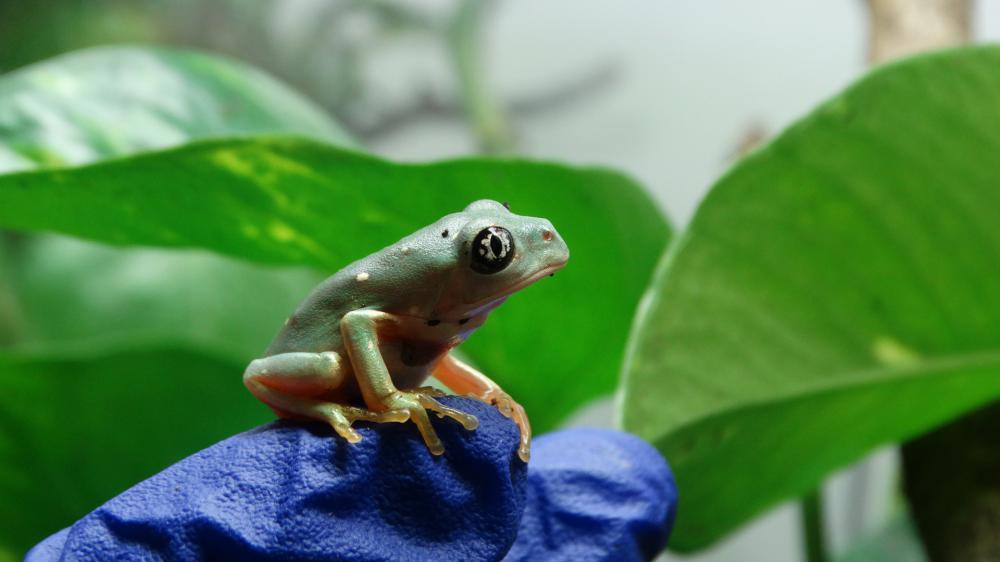For the first time in the Cotswold Wildlife Park’s history, the Reptile Team has successfully bred Giant Mexican Leaf Frogs (Agalychnis dacnicolor).
The Cotswold Reptile team say in the wild, this unusual species is found only in the sub-tropical forests of Mexico and requires highly specialised conditions to breed.
According to the Zoological Information Management System (ZIMS), Cotswold Wildlife Park is the only zoological collection in the world to have successfully bred Mexican Leaf Frogs in the last twelve months and has become only the second collection in history to have achieved success breeding these rare amphibians.
Keepers had to carefully recreate conditions to mimic the dry forests of Mexico, where this species originates.
Reptile Keeper Meg Howard explains: “This is a great success for our team and a first for this species at the Park. For me, the best moments were discovering the first big clump of frogspawn (image in photo gallery) and seeing it start to develop within just 24 hours, and then to see the first froglet climbing out of the water.
"Frogs are one of the most charismatic creatures on earth and rearing them is one of my absolute favourite parts of my job. To be involved with our first-time breeding success is a career highlight for me”.
Curator of Cotswold Wildlife Park, Jamie Craig, added: “We treat the rearing of any amphibian to adulthood as a success. The metamorphosing stages can be very tricky and we are delighted to have had success with our Mexican Leaf Frogs”.
At the delicate stage of the froglets development, the new arrivals will remain off-show in the specialist Amphibian Breeding Room, but visitors can see the adults in their exhibit adjacent to the Yellow Mongoose.
Very little is said to be known about this species in the wild. Ecologist and evolutionary biologist, Thomas Wiewandt, made detailed observations in his field study 'Breeding Biology of the Mexican Leaf-Frog.'
He described this species as: “A handsome amphibian being somewhat unconventional in their reproductive habits”. Due to the extreme weather conditions of their natural environment, these highly specialised amphibians have evolved to limit their reproductive efforts to a few brief hours each year.
"Due to soaring temperatures in their native homeland of Mexico, this species can have as little as twenty-four hours before ponds essential for egg survival completely dry up. Breeding is a brief affair and triggered by the arrival of summer rains when these dry ponds temporarily fill with water and the mating calls begin.
"When the female is ready to deposit her eggs, rather than lay them in the water, they are affixed to the leaves of shrubs and trees. As temperatures can reach over 45°C, lethal to a developing egg, the female Mexican Leaf-Frog must take up additional water through the cloaca for successful egg-laying.
"She fills her bladder with water from the pond which in turn is released as she deposits her eggs. When empty, she returns to the pond for more. The liquid she excretes from her bladder helps form the complex gelatinous matrix of the egg mass – without it, eggs fail to develop properly.
"By day five the spherical membranes are almost ready to hatch. The young tadpoles, approximately ten millimetres in length, fall directly into the pond or ground."
The journey of those that failed to land in water is described by Wiewandt who witnessed this event in Sonora, Mexico: “Tadpoles that fell to the ground could easily make their way to the water by flipping down the bank like tiddlywinks, spanning some three to four inches with each flip. They were able to clear hurdles of about an inch in height above the terrain”.
The droughts and extreme temperatures of mid-August in Mexico brings the breeding season to a close and the next chance the Mexican Leaf Frogs will have the opportunity to breed again will be the following summer as the seasonal ponds have dried up.
These new additions at Cotswold Wildlife Park are just one of the many breeding successes the Reptile team are currently celebrating. No sooner had the last Mexican Leaf Frog tadpole completed its metamorphosis into a froglet when keepers discovered that the Park’s Mossy Frogs, Cinnamon Frogs and Poison Dart Frogs had also produced eggs. These are under the expert care of the team in the off-show breeding room.
Amphibians are the most threatened group of vertebrates on the planet. According to Scientific American magazine: “Amphibians are going extinct faster than any other group of organisms”. The International Union for Conservation of Nature’s Red List of Threatened Species considers 41 per cent of the world’s amphibians to be threatened with extinction.
Their main threats include, Chytrid (a virulent fungal disease fatal to amphibians), habitat destruction, air and water pollution, pesticides and climate change.
Amphibians are referred to by experts as the “canaries in the coalmine” due to their extreme sensitivity to environmental changes which could ultimately lead to their extinction and are an early warning of things to come.
The Cotswolds team say "If we lose these beautiful creatures, other species will unfortunately follow. Urgent conservation action is needed."
On 28 April each year, the worldwide campaign ‘Save The Frogs Day’ takes place. Now in its 24 year, its aim is to raise awareness of the rapid disappearance of frog species globally and share knowledge needed to protect amphibians from extinction. April is also National Frog Month.
More information about Cotswold Wildlife Park can be found on its website at www.cotswoldwildlifepark.co.uk









Your Comments
Be the first to comment on this article
Login or Register to post a comment on this article